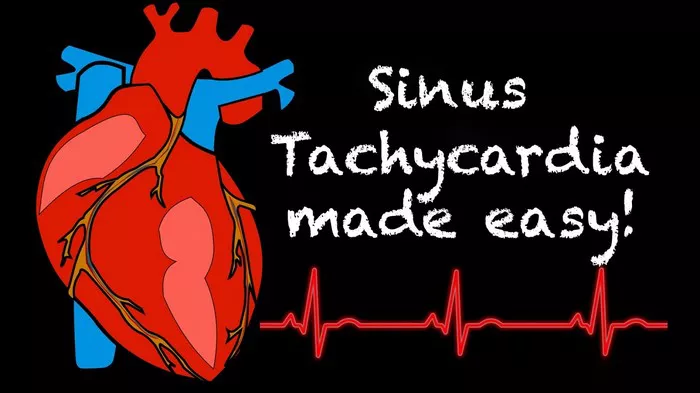Sinus tachycardia is a condition characterized by a faster-than-normal heart rate, typically above 100 beats per minute in adults. While it can be concerning, especially when experienced frequently or for prolonged periods, the question many people have is whether sinus tachycardia will go away on its own or require medical intervention. In this article, we delve into the details of sinus tachycardia, including its causes, symptoms, diagnosis, and treatment options, to provide a comprehensive understanding of this cardiac condition.
Understanding Sinus Tachycardia
Sinus tachycardia is a type of arrhythmia that originates in the sinoatrial (SA) node, the heart’s natural pacemaker. The SA node regulates the heart’s rhythm by generating electrical signals that coordinate the heart’s contractions. In sinus tachycardia, the SA node sends out signals at a faster rate than normal, leading to an increased heart rate.
Causes of Sinus Tachycardia
Several factors can contribute to the development of sinus tachycardia, including:
1. Physical Activity: During exercise or physical exertion, the body’s demand for oxygen and nutrients increases, leading to a temporary increase in heart rate, known as physiological sinus tachycardia.
2. Stress and Anxiety: Emotional stress, anxiety, or panic attacks can trigger a temporary increase in heart rate due to the release of stress hormones like adrenaline.
3. Fever and Illness: Infections, fever, or other medical conditions that cause an increase in body temperature can result in sinus tachycardia as the body works harder to fight off the illness.
4. Dehydration: Lack of adequate fluid intake can lead to dehydration, which can affect blood volume and lead to an increased heart rate.
5. Medications and Stimulants: Certain medications, such as decongestants, asthma inhalers, or stimulants like caffeine and nicotine, can stimulate the heart and cause sinus tachycardia.
6. Thyroid Disorders: Hyperthyroidism, a condition characterized by an overactive thyroid gland, can result in sinus tachycardia due to increased thyroid hormone levels affecting heart function.
7. Electrolyte Imbalances: Abnormal levels of electrolytes such as potassium, calcium, or magnesium in the blood can disrupt the heart’s electrical activity and lead to tachycardia.
Symptoms of Sinus Tachycardia
The symptoms of sinus tachycardia can vary depending on the underlying cause and individual health factors. Common symptoms may include:
1. Rapid Heartbeat: Feeling like the heart is racing or pounding.
2. Palpitations: Sensation of fluttering or irregular heartbeats.
3. Shortness of Breath: Difficulty breathing, especially during physical activity or exertion.
4. Dizziness or Lightheadedness: Feeling faint or dizzy, particularly when standing up quickly.
5. Chest Discomfort: Mild chest pain or discomfort may occur in some cases.
It’s essential to note that not everyone with sinus tachycardia experiences noticeable symptoms, especially if the condition is mild or transient.
Diagnosis of Sinus Tachycardia
When evaluating a patient for sinus tachycardia, healthcare providers typically follow a systematic approach to diagnose the condition and determine its underlying cause. This may involve:
1. Medical History: Gathering information about the patient’s symptoms, medical history, medications, and lifestyle factors that may contribute to tachycardia.
2. Physical Examination: Checking vital signs, listening to the heart and lungs, and assessing overall health status.
3. Electrocardiogram (ECG): A standard diagnostic test that records the heart’s electrical activity, helping identify abnormalities in heart rate and rhythm.
4. Blood Tests: Checking for markers of thyroid function, electrolyte levels, and other potential causes of tachycardia.
5. Holter Monitoring: A portable ECG device worn by the patient for an extended period (usually 24-48 hours) to monitor heart activity and capture any intermittent arrhythmias.
6. Stress Test: Evaluating heart function during physical stress (e.g., exercise stress test) to assess how the heart responds to increased workload.
7. Other Imaging Tests: In some cases, additional imaging tests such as echocardiography or cardiac MRI may be recommended to assess heart structure and function.
Treatment Options for Sinus Tachycardia
The approach to treating sinus tachycardia depends on several factors, including the underlying cause, severity of symptoms, and overall health of the patient. Treatment options may include:
1. Addressing Underlying Causes: Identifying and addressing any underlying medical conditions or triggers contributing to sinus tachycardia, such as fever, dehydration, thyroid disorders, or medication side effects.
2. Lifestyle Modifications: Encouraging lifestyle changes such as regular exercise, stress management techniques, adequate hydration, and avoiding excessive caffeine or stimulant intake.
3. Medications: In some cases, medications may be prescribed to help regulate heart rate and rhythm. These may include beta-blockers, calcium channel blockers, or antiarrhythmic drugs.
4. Therapies and Procedures: For persistent or severe cases of sinus tachycardia that do not respond to conservative measures, interventions such as catheter ablation or electrical cardioversion may be considered.
5. Monitoring and Follow-up: Regular monitoring of heart rhythm, symptom management, and follow-up appointments with healthcare providers are essential to track progress and adjust treatment as needed.
Will Sinus Tachycardia Go Away?
The prognosis for sinus tachycardia depends on various factors, including the underlying cause, overall health status, and response to treatment. In many cases, sinus tachycardia related to temporary factors such as physical exertion, stress, or fever will resolve on its own once the underlying trigger is addressed.
However, for individuals with persistent or recurrent sinus tachycardia or underlying heart conditions, ongoing management and monitoring may be necessary to control symptoms and prevent complications. It’s crucial for patients to work closely with their healthcare providers to develop a personalized treatment plan and address any underlying health concerns contributing to tachycardia.
Conclusion
Sinus tachycardia is a common cardiac arrhythmia characterized by a faster-than-normal heart rate. While it can be alarming, especially when associated with symptoms such as palpitations or dizziness, sinus tachycardia often resolves on its own with appropriate management of underlying causes and lifestyle modifications. However, individuals experiencing persistent or severe symptoms should seek medical evaluation and guidance for proper diagnosis and treatment.


